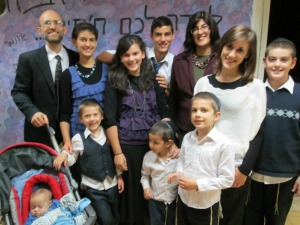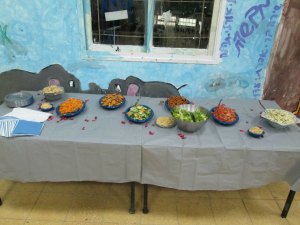It’s not only because I’ve been so busy that I pushed off the bas mitzva celebration for my dd12 for over a month. It’s also because thinking about planning it was stressing me.
You’d think that since I’ve made so many family events – bar mitzvas, bas mitzvas, brissim, shalom zachors, kiddushes, siyums – that making this bas mitzva really wouldn’t be a big deal for me. In fact, dd12’s teacher said to me tonight that she can tell that I’ve done this before since it looks so easy for me. It’s not that physically preparing is a big deal for me. The shopping, baking, cooking, and set up definitely took a good bit of time and energy. But that doesn’t really phase me.
What was bothering me was the idea of having to entertain a large group of Israeli girls. We were inviting her entire class (34 girls), many of whom dd doesn’t have much of a relationship with, particularly since she doesn’t yet speak Hebrew. It’s a different culture and I felt very pressured because I didn’t want to emcee an event like this in Hebrew. What finally helped me reduce my low grade anxiety about this was my decision a few days ago to call in some outside support – a woman who would bring the music and lead the dancing. This was a huge concern off of my shoulders, since the dances are different here from the US and the girls at this age need someone to actively demonstrate what to do in order to follow the moves.
It was a very busy day, made busier by needing to clean the entire facility that we were renting before using it. It was a good price, but that wasn’t something I was expecting, and it set me back on schedule by a couple of hours. So after setting up the tables with the kids, I went back home to get dressed and put together my talk. No, this really wasn’t part of my plan – I wanted to have everything set up two hours in advance because as I’ve mentioned before, I try to avoid last minute pressures that lead to tension. While I was at home, I finished prepping the last salad, then tried to reach the woman who was supposed to lead the dancing to make sure she was still on for the evening (our phone line was down since Thursday night so she wouldn’t have been able to get through to me), but her line was busy. Finally I called a friend to ask her to bring a music cd just in case the first woman was delayed.
I managed to get dressed and spend a whopping three minutes thinking about what I wanted to say before I needed to leave, and got back just in time to welcome the first guests who arrived a few minutes early. That was when dh told me the dance leader had called him and said she was sick and wouldn’t be coming. But not to worry, she had asked dd’s teacher to fill in. Remember, having this woman here was a big factor in me feeling like I wasn’t responsible for the entire evening, and now I had no music, no one to lead the dancing (which was a big part of the scheduled evening) – but obviously that’s how it was meant to be because that’s how it was, so there was no point in getting frustrated.
We decided against a full sit-down meal, and instead had a salad course and a desert course. The salad course included: tomato olive salad, Moroccan carrot salad, cucumber salad, tabouli, German pasta salad, leafy pomegranate salad and hummous. We also put out crackers and pretzels, as well as a drink table. (Those are dried rose petals sprinkled on the table between the serving bowls in the picture below.)
We weren’t able to put together the slide show we wanted to do, but instead dd18 put together a photo montage of dd12 that was displayed for people to look at when they came in.

This was really nice, since as her classmates began to arrive, they felt a bit uncomfortable. I suggested they sign the journal with a message for dd, and then they enjoyed looking at the photo montage. A short time after this (though when you’re waiting for something and not knowing when/if you’re going to get it, it doesn’t seem like a short time!), someone arrived with the music cd that had been sent by the woman who wasn’t able to make it due to sickness. Music really adds to the ambience, and we had borrowed speakers so we were good on that front.
We made the decision to limit the adults we invited, in order to keep the focus on dd and her friends. For this reason, we also limited the age of girls attending to 9 and up, though dd is beloved by a number of younger girls in the school and they would have been happy to have come! We invited about ten women, and six came.
After encouraging everyone to get something to eat, I spoke about the security situation we’re facing in our country and began with having everyone say a chapter of Psalms out loud together after me. Then I talked about the spiritual inspiration people can feel at times when they feel their lives are threatened – for example, 9-11 was a country-wide wake up for Americans – but that inspiration doesn’t last long unless it’s acted upon. I tied it into the inspiration of the High Holy days, that are behind us, and the upcoming holiday of Chanuka – the festival of lights.
I shared the quote “The candle of G-d is the soul of man”, and explained that the way we light candles within our souls is by taking action to become better people, to actualize the inspiration we’ve felt. This is is a particularly important message for a girl becoming bat mitzva – because what we’re celebrating is that a young girl is now spiritually an adult and able to serve G-d with the corresponding increased awareness and responsibility. I then shared about how dd had risen to the challenge of making aliyah at an age and stage when this is a very difficult thing to do, and the positive character traits that this showed. Since I spoke in Hebrew, dd16 translated the key points for dd12 to be sure she followed everything.
After I spoke, dd16 spoke about dd12 (also in Hebrew). Although afterward she was felt that she had forgotten to say many of the things she wanted to say, it was heartfelt and very nice – she spoke about how special dd is and how much she appreciates being her sister, and repeated some of her points in English for dd.
My husband and the boys (except for ds19) were there until this point. In the middle of my talk, the teacher walked in, and we were able to begin the dancing right after dd16 finished speaking. This was so, so nice – exactly what I had hoped for. I really wanted something fun and enjoyable for the girls to do together, something that dd12 could do with them without needing to speak. I wanted it to be an enjoyable evening for everyone, not just sitting around, eating, and then going home (not to imply there’s anything wrong with that – it’s just that it wasn’t right for dd).
They danced for a long time and then we brought out the desserts. Dd16 was totally responsible for all of this: three different kinds of jelly roll (white with lemon filling and frosting, white with chocolate filling and frosting, and chocolate with chocolate filling and frosting), chocolate layer cake, Boston cream pie, nut bars, peanut butter diamonds, oatmeal bars, and layered jello and cream. We also put out snack crackers.
While everyone sat down and had some dessert, dd12’s Hebrew tutor spoke. This is the person outside of our family who has spent the most time with dd and is able to see who she is (this is very different depending on if she’s with English speakers or not). She started off by saying something like this: ‘Girls, if you don’t speak English you don’t know what you’re missing, because you can’t really know who (dd) is and that’s a big loss for you! (Insert nice comments about how wonderful dd is here.) So you have a choice, to learn English or to teach her Hebrew!’ She went on to share some lovely ideas that she tied into dd12’s positive character traits.
After this, dd17 spoke. She hadn’t been sure she would speak until I called her up to the front, and decided to speak in English. As a preface to this, I told the girls, “For the next few minutes you’re going to get to see what it’s like for dd12 – except this is what she goes through hour after hour, day after day, week after week, and month after month. You can get a tiny sense of what it’s like to have to sit and listen to someone and have no idea what they’re saying.” Then dd spoke, beginning with one of her first memories of dd12 and continuing by telling dd12 how special she is and how happy she is to have her as a sister. (In case you’re wondering who was listening to her if dd’s classmates speak Hebrew, there were the adult women, the teachers, and about ten of the girls there come from English speaking homes. As far as the Hebrew speaking classmates, they learn English in school, so there was some level of comprehension – though for some very minimal – of what was being said. And most importantly was dd, since dd17 wanted her to fully understand what was being said about her.)
After this, we put on the dance music again. Although the teacher leading the dancing had left, the girls were much more comfortable and they danced, and danced. As someone said to me, these girls just don’t want to leave! I was so glad that everyone was having such a nice time!

The party ended up lasting for 3.5 hours, instead of the projected 1.5 – 2. We all had a really nice time, especially dd12. This is the third bas mitzva that I’m sharing about here on my blog, and I am so happy and grateful that it went so well!
Avivah

